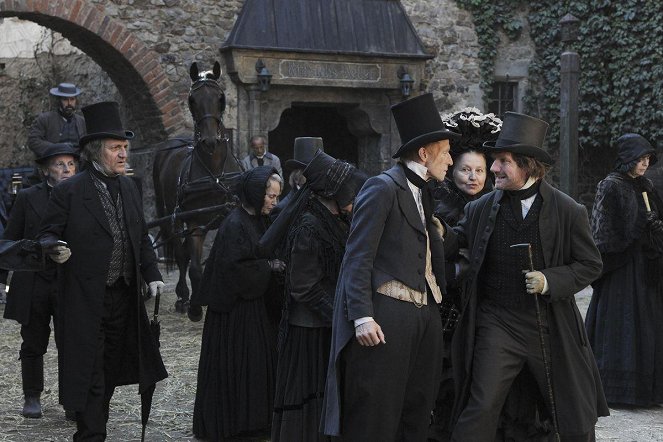Réalisation:
Aleksandr SokurovPhotographie:
Bruno DelbonnelMusique:
Andrey SigleActeurs·trices:
Johannes Zeiler, Hanna Schygulla, Anton Adasinsky, Antoine Monot Jr., Isolda Dychauk, Georg Friedrich, Andreas Schmidt, Yuriy Arabov (plus)VOD (1)
Résumés(1)
Librement inspiré de l'histoire de Goethe, Alexandre Sokourov réinterprète radicalement le mythe. Faust est un penseur, un rebelle et un pionnier, mais aussi un homme anonyme fait de chair et de sang conduit par la luxure, la cupidité et les impulsions. (Sophie Dulac Distribution)
Critiques (3)
Really not a movie that you would have for breakfast and digest by dinner time. I got the impression that Sokurov was trying to cram as many of the ideas from Goethe’s masterpiece as possible into two hours, highlighting “his” themes (death, corporeality, the passage of time), while giving the actors enough space. There is no silence or empty space for contemplation. Wherever the protagonist goes, someone accompanies him, something is happening around him. This is even more apparent after the devil (characteristically a moneylender by trade) becomes his guide, deliberately causing chaos. Even the visually enchanting walk taken by Faust and Margarete is disrupted at least by the voices of other characters. The density of sounds, images and ideas evokes in the viewer and in Faust the same desire, a longing for peace and quiet. Like the questions that are raised, the direction of the narrative is determined by his search. Given the corruption of the world, there is only one way to recognise good, if it exists – through evil. It is necessary to begin with that, with the shallow, disgusting and malodorous. With the ubiquitous. The diversion from the path of science and faith to dangerous doubts is “materialised” by replacing the spiritually oriented father with a man who reeks of death. The bodies of Faust and the father and of Faust and the devil almost merge in some shots through close physical contact – constant and not always welcome physical contact with others, constant pushing and rubbing, creates an impressive contrast to the purity of the relationship between the doctor and Margarete, when the touches are tender and desirable. The predominant naturalism in the depiction of filthy reality gives rise to magical-realistic scenes that are bizarre in the manner of Lynch (a vagina, homunculus) and combine the worlds of the known and the unknowable. The world of male rationality and the world of a mysterious woman, between which lost souls are guided by the genderless devil. The use of the space’s geometry and the frequent descents and ascents comprise the main and least ostentatious indicator of transitions between dreams and reality. Optical deformations of the picture play a similar role on the visual level, raising the suspicion that the projectionist has incorrectly loaded the film in the projector (or that it is a mirror reflection). The turning of attention to the medium itself can be understood as the director challenging us to accept the deformed rules of the world created and controlled by him, which serves primarily for verbal philosophical disputation. This of course does not mean that there are not images that defy any kind of verbal description (in the landscape of medium shots “radiating” a close-up of Margarete’s face). It is not possible to capture Goethe’s Faust in brief; Sokurov’s Faust is similarly ungraspable and, for anyone who has yet to be sufficiently educated by life, equally incomprehensible. 80%
()
Le plus grand atout du film est également sa plus grande faiblesse : le contrepoint entre la matière et l'esprit, le corps et l'âme. La matérialité du corps entre brillamment dans l'évanescence typiquement sokurovienne et dans les images lyriques classiques/préromantiques. Le corps dégoûtant et gonflé de Méphisto au milieu de la pureté féminine dans l'introduction ; la beauté de Marguerite se finissant progressivement par un plan de vulve : symbole de la rupture progressive de l'équilibre entre l'âme et le corps et de la réduction de la noblesse humaine (sa répulsion envers Dieu) à une essence animale. Qui a introduit le déséquilibre et le Péché dans le monde de l'équilibre entre l'âme et le corps ? Qui a renoncé à l'ascèse patiente de la connaissance, qui a échangé la promesse de la science, toujours en avance vers le futur, contre une nuit avec Marguerite ? Et la réponse est également la réponse à la question de savoir pourquoi cette interprétation religieuse typique est le plus grand défaut du film : contrairement à la grande œuvre de Goethe, elle réduit complètement l'histoire de Faust à un combat manichéen entre l'âme et la matière - seul Méphisto peut émaner du corps, de la matière, du sexe. Faust n'est plus un héros qui se sacrifie, celui qui a déjà tout atteint grâce à la science et qui se lie au diable pour en apprendre encore plus, il doit donc connaître ce qui échappe à la science. Maintenant, il n'est qu'un travailleur spirituel impatient et vaincu, qui s'est soumis au désir et a fini dans un désert aride, signifiant la mort du corps et de l'esprit. Les "Jours de l'éclipse" de Sokurov se déroulaient également dans un désert, mais ici, la direction était opposée : se libérer de la réalité sale menait vers le haut... ici, on tombe de Dieu. Cela doit donc également se refléter dans l'évaluation.
()
An interesting adaptation of the classic, which is, on one hand, historically fairly accurate in the sense that there are indeed well-crafted sets and you get a clear sense of the time period. But on the other hand, it's also a film that has its dreamlike elements and works in that regard as well. Even so, that doesn't mean I actually enjoyed it, which is reflected in my rating.
()

